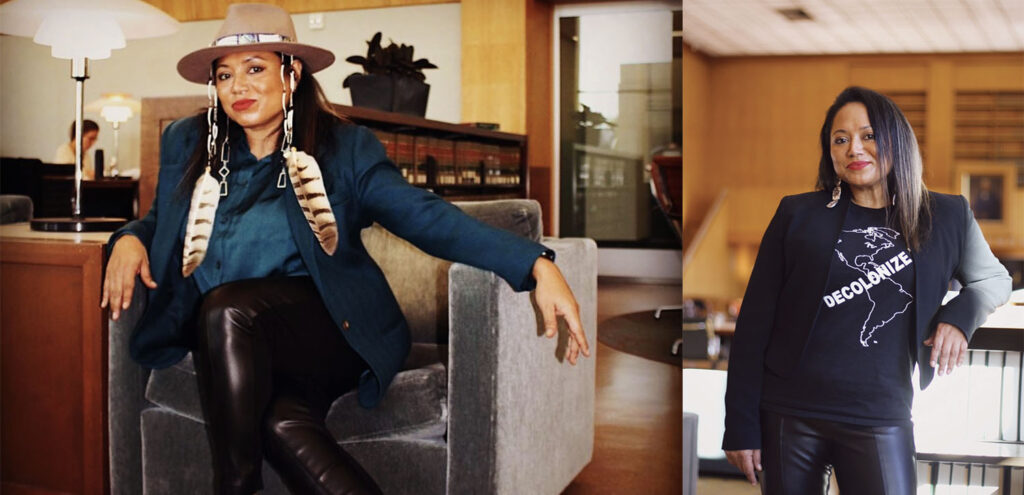By Alliance President Terry Gips
The colonization of Indigenous people has led to the erasure of their voices, leading Western culture to a fundamental disconnect with the natural world. At the Alliance, we’ve always felt this is a tragedy leading to the subjugation of people and decimation of our planet and all life. To help address this crisis, we are sharing Part 1 of a 2-part series on the profound perspectives of Alaska Native (Denaakk’e) Nazune Menka, as written in UUWorld. Here, in her own words, she presents an Indigenous worldview and shows how to live within a healthy, thriving world:
“Some twenty years ago, in a nondescript conference room…I witnessed an Alaska Native Elder cry while discussing climate change. This Elder and her community have been living on the land — and existing off of it — for eons. She described changes many of us would find too subtle to notice — changes in seasonal migration patterns; changes in stark contrast to their memories before the impact of chemical pollution, which has thinned the eggshells of native birds; changes since spring started arriving too early, thawing the ice and putting the community at risk.”
“As an Alaska Native (Denaakk’e) myself, I’d listened to Elders tell similar stories, but this moment is crystallized in my mind for its juxtaposition between an Indigenous worldview and the western contemporary environment it was being shared in. The Elder had traveled from home to the National Tribal Conference on Environmental Management in Reno, Nevada, to share her story.
“She was doing more to combat climate change two decades ago than most people care to do today, despite the plethora of scientific evidence showing catastrophic climate change, as well as the fires, tornados, and temperature changes that nearly everyone is experiencing.
“For Indigenous Peoples around the world, climate change has long been more than an abstract, futuristic possibility. It has been a reality affecting the harvesting of our traditional foods and our ability to hunt and fish, affecting our ability to live on our ancestral homelands, and changing a way of life that we have been living since time immemorial.
“The importance of an Indigenous worldview is illuminated by the impacts of climate change, and climate change is exacerbated by the western world’s historic and contemporary reliance on imperialistic endeavors to extract resources in the name of capitalism.
“But we cannot drink oil nor can we eat money.
“Indeed, Elders all over Turtle Island tell stories of a time to come when the world will be forced to return to Indigenous ways, a time when the world will need our ways in order to heal itself.
“I do not speak for all Indigenous Peoples. However, as an Indigenous woman, and in my professional work as an Indigenous scientist and attorney advocate, I feel compelled to share my general perspective on what I believe an Indigenous worldview has to offer the world.
“At the center of this worldview, all things are connected and interconnected, dependent and interdependent. There is no separation from what some might call the “natural” world and what some call the “spiritual” world. Rather, these two entities coexist and are inseparable.
“Under this worldview, each natural formation or animal has power, mana, or a spirit, and therefore is a relative to us requiring respect, stewardship, and honor. Many Indigenous communities refer to themselves in their own languages as what roughly translates to “the People” (Denaakk’e, Diné, Dene), and we the People, too, are part of this natural world.
“All power, whether within the People or the natural world, is sourced from the earth itself. In this way, the relationship between the People, the earth, and the natural world is governed by, and requires, respect and stewardship to keep the relationship right. If there is an imbalance in this relationship, it is because respect has not been paid.
“Thus, under an Indigenous worldview, if we are experiencing drought, fires, and natural disasters, it is because of our disrespectful actions. One can easily begin to see how commodification of land and provoking imbalance spurred by resource extraction are at odds with this worldview. What is being returned to the land? How are we paying respect or stewarding a right relationship? We are taking and providing nothing in return.”
We hope Nazune Menka’s perspectives can help you have more hope and reconnect with the land and people around you to be in “right relationship.”
In Part 2, we’ll focus on how she feels Indigenous perspectives are positively impacting our world. You can follow Nazune Menka on Instagram.

